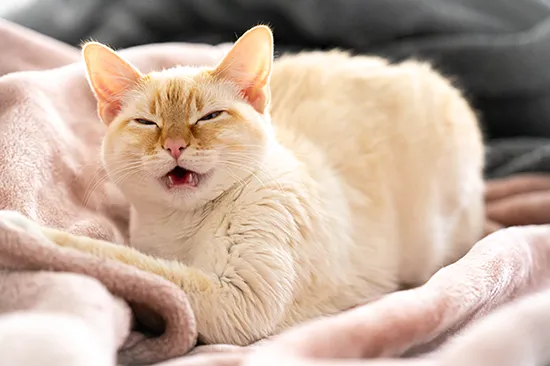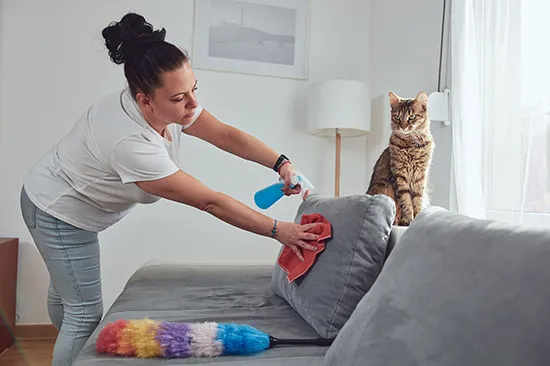Understanding sneezing in cats
Cats can have episodes of sneezing, much like people. Even if it happens frequently, it's crucial to comprehend the fundamental reasons to protect your feline companion.
Let's examine the most prevalent causes of feline sneezing as we dig deeper into the topic.

Causes of sneezing in cats
There are a variety of potential causes that could trigger sneezing in your cat, ranging from underlying health issues to environmental factors.
- Upper respiratory tract infections: Sneezing, coughing, and nasal discharge are common symptoms of bacterial or viral infections, which are among the leading causes of sneezing in cats. Some of these infections can be prevented through vaccinations, highlighting the importance of keeping your cat’s vaccinations up to date.
- Allergic rhinitis: Cats can suffer from allergies, a condition known as feline allergic rhinitis. While less common than in humans, cats with allergies often show symptoms similar to those of hay fever, including sneezing, nasal discharge, and eye irritation.
- Foreign objects: Sneezing can be brought on by inhaled allergens such as dust, hair, grass seeds or tiny objects.
- Dental issues: Sneezing may result from post-nasal drip, which is caused by dental issues such as gum disease or tooth decay.
- Environmental stress: Cats may sneeze as a result of environmental stressors like moving to a new house or getting a new pet.
Common allergens for cats
As previously mentioned, cats, like humans, can be allergic to various chemicals in their environment. Below are some of the most common allergens that may trigger sneezing and other allergy symptoms in cats:
- Pollen: Sneezing and other allergic symptoms can be brought on by seasonal allergies to pollen from grasses, trees, and weeds.
- Dust mites: These are microscopic organisms that live in dust and can cause respiratory irritation in cats.
- Mould: Environmental mould spores can potentially cause allergic responses in cats.
- Specific foods: In addition to other digestive problems, food allergies can occasionally cause sneezing.
Ways to manage cat allergies
While there's currently no cure for feline allergies, there are several strategies to help manage symptoms and improve your cat's quality of life:
- If possible, identify specific allergens that trigger your cat's symptoms and minimise their exposure. Avoid using aerosols, plug- ins or smoking in your cat’s environment.
- Regularly clean your home to reduce dust mites and other allergens.
- Using a high-efficiency particulate air (HEPA) filter can help remove allergens from the air.
- Your vet can prescribe medications, such as antihistamines or corticosteroids, to alleviate symptoms.

When to seek professional advice
Your vet should be consulted if your cat's sneezing is severe and accompanied by other symptoms such as lethargy, appetite loss, or breathing difficulties. Contact Blacks Vets in Dudley, they will be able to identify the root cause and suggest suitable care.
Preventing sneezing cats
While sneezing in cats can't be entirely prevented, there are proactive steps you can take to minimise its frequency and improve your cat's respiratory health:
- Keep up to date with booster vaccinations and schedule routine health checks to keep an eye on your cat's general health and take care of any underlying problems.
- Your cat's immune system and general health can be strengthened by eating a balanced diet of healthy foods .
- Reduce stress-related health issues by creating a serene atmosphere.
- Maintain a fresh and clean litter box for your cat to reduce exposure to irritants.
By being aware of the common reasons why cats sneeze and taking these precautions, you can make it simpler for your pet to breathe and lead a better, happier life.
Find out more by visiting Blacks Vets in Dudley
For more advice on your cat's health and possible reasons behind their sneezing, book a consultation with your vet today! Find out how to help and to understand your cat’s health.


